Doctor Communication: How to Talk to Your Doctor and Get Better Care
Talking clearly with your doctor changes outcomes. Good communication helps get the right diagnosis, safer prescriptions, and faster relief. Use these simple, practical steps every time you see a clinician—live or online.
Prepare before the visit. Write a short list of your top 3 concerns, current medicines (including doses), allergies, and recent test results. Bring a symptom diary with dates and triggers. If you have a phone, take photos of rashes or swollen areas to show during the visit.
Say what matters first. Start with the biggest problem: "My chest tightness started two days ago and gets worse when I climb stairs." Be specific about timing, what makes it better or worse, and how severe it feels on a 0–10 scale. That helps the doctor prioritize tests and treatment fast.
Ask clear questions. Use short direct questions like "What is the most likely cause?" "What tests do I need?" "What are the possible side effects?" If you don't understand, say so: "Can you explain that in plain words?" Repeat back the plan: "So I need blood tests and start this medicine for two weeks, right?"
Talk about medicines openly. Mention over-the-counter drugs, supplements, and herbal remedies. Some can interact badly with prescriptions. If cost is an issue, ask for cheaper alternatives or generic brands. Ask when to stop or follow up and what warning signs mean you should call.
Use the patient portal and notes. After the visit, check the portal for test orders, prescriptions, and visit notes. Correct errors quickly—wrong allergies or medications can be dangerous. Message your clinician with short updates: "New symptom: increased dizziness after taking med X."
Make telemedicine work. For video visits, find a quiet, well-lit spot and test your camera and microphone. Have your list and medications nearby. If video quality is poor, switch to phone and follow up with photos or portal messages.
Bring a helper if needed. A friend or family member can take notes, ask questions you forget, and help you make decisions. Let the clinician know you want them involved in your care and what decisions you need help with.
Share your life context. Tell the doctor about your work, sleep, diet, stress, and family history. That gives clues that change diagnosis and treatment. For chronic conditions, set realistic goals together, like lowering blood pressure by 10 mmHg in three months or improving sleep by two nights per week.
When things go wrong, speak up. If symptoms worsen or side effects appear, contact the clinic early. If you feel dismissed, ask for a second opinion or switch clinicians. You deserve clear answers and care that fits your life.
Small steps make visits more productive. Prepare, speak plainly, ask the right questions, and use follow-up tools. Good communication makes care safer and faster.
Keep a medical folder with scanned records, vaccination dates, and current medication lists to share with any new doctor — it saves hours and reduces errors.
How to talk to your doctor about Solifenacin and overactive bladder
As someone dealing with an overactive bladder, I know how important it is to have open communication with my doctor. Before my appointment, I plan to research Solifenacin to understand how it might help me. I'll make a list of questions and concerns I have about the medication, such as potential side effects and how it may interact with other medications I'm taking. During my appointment, I'll be honest about my symptoms and discuss my findings with my doctor, making sure to address all my concerns. Together, we'll decide if Solifenacin is the right treatment option for my overactive bladder.
read moreHow to talk to your doctor about Solifenacin and overactive bladder
In my recent quest to manage my overactive bladder, I've discovered Solifenacin as a potential solution. To discuss this option with my doctor, I plan on mentioning my symptoms, my research on Solifenacin, and my concerns about side effects. I'll also ask about possible alternatives and my doctor's experience with prescribing Solifenacin to other patients. By being open and honest about my needs and concerns, I hope to have a productive conversation with my doctor and find the best solution for managing my overactive bladder.
read more
